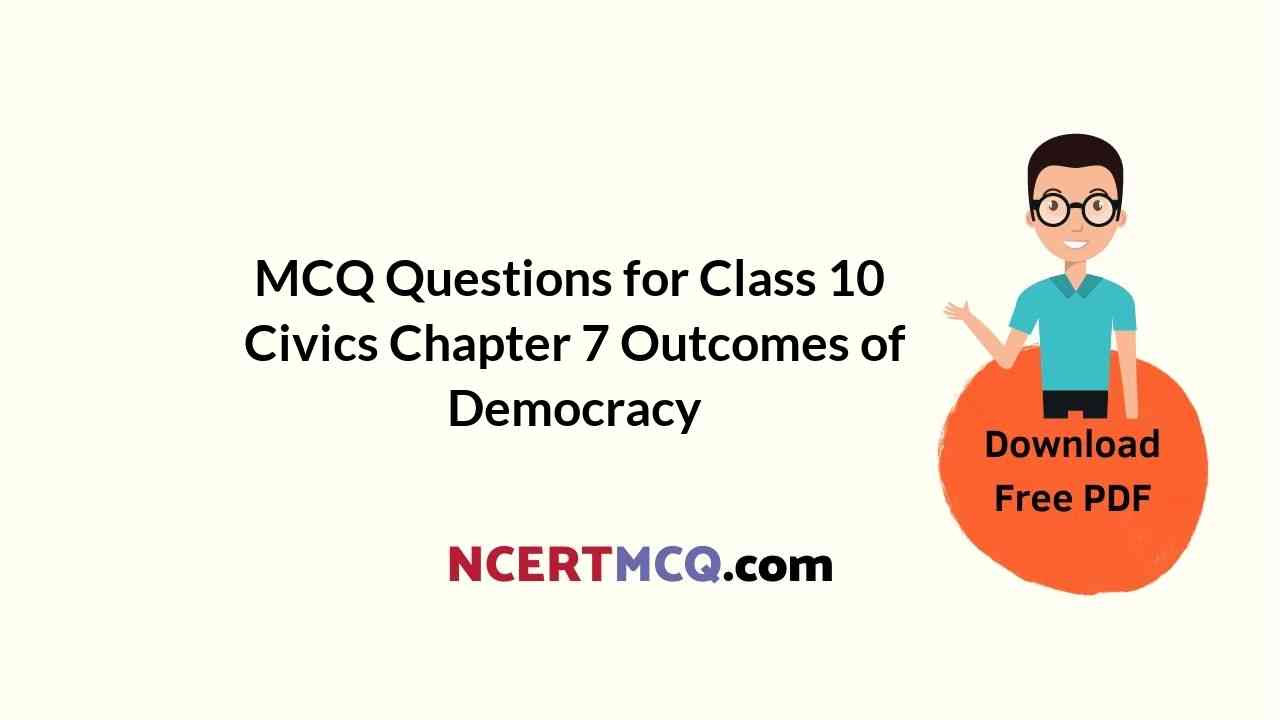Students can also read Online Education MCQ Questions for Class 10 Civics Chapter 7 Outcomes of Democracy Questions with Answers hope will definitely help for your board exams. https://ncertmcq.com/mcq-questions-for-class-10-social-science-with-answers/
Class 10 Social Science Civics Chapter 7 MCQ With Answers
Civics Class 10 Chapter 7 MCQs On Outcomes of Democracy
Outcomes Of Democracy Class 10 MCQ Question 1.
Which of the following countries tops in the index of inequality of income?
(a) Hungary
(b) Russia
(c) South Africa
(d) UK
Answer:
(c) South Africa
Outcomes Of Democracy MCQ Question 2.
To measure democracies on the basis of expected outcomes, which of the following parameters should one look for?
(I) Regular, free and fair elections.
(II) Local Self Governments.
(III) Citizens’ right to information about the government.
(IV) Citizen’s non participation in the political processes.
(V) Open public debate on major policies.
(a) (I), (II) & (IV)
(b) (I), (III) & (V)
(c) (I), (II), (III) & (IV)
(d) (I), (II), (III) & (V)
Answer:
(d) (I), (II), (III) & (V)
Explanation: Citizen’s participation in the political processes is an important parameter to test successful democracies.
MCQ On Outcomes Of Democracy Class 10 Question 3.
Which of the following statements do not hold true for non-democratic regimes?
(I) These regimes do not have to bother about public opinion.
(II) These regimes take a lot of time to decide.
(III) Principle of individual dignitg has legal and moral force here.
(IV) These often suppress internal social differences.
(a) (I), (II) & (IV)
(b) (I) & (IV)
(c) (I), (II) & (III)
(d) (I), (II), (III) & (IV)
Class 10 Civics Chapter 7 MCQ With Answers Question 4.
Fill in the blank by choosing the most appropriate option:
Equal treatment of women is a necessary
ingredient of a society.
(a) Non-Democratic
(b) Monarchical
(c) Autocratic
(d) Democratic
Answer:
(d) Democratic
![]()
MCQ Of Outcomes Of Democracy Question 5.
Which of the following countries has half of its population living in poverty?
(a) Uzbekistan
(b) Libya
(c) Bangladesh
(d) Pakistan
Answer:
(c) Bangladesh
Outcomes Of Democracy Class 10 MCQ With Answers Question 6.
Why is there a delay in decision-making and implementation in a democratic set up?
(a) The government is afraid of taking decisions.
(b) The government is not worried about taking decisions.
(c) Democracy is based on the idea of deliberation and negotiation.
(d) A democratic government does not have a medium of taking decisions.
Answer:
Class 10 Outcomes Of Democracy MCQ Question 7.
Which one of the following is the most popular form of government in the contemporary world?
(a) Dictatorship
(b) Monarchy Rule
(c) Military Rule
(d) Democracy
Answer:
(d) Democracy
Outcomes Of Democracy MCQs Question 8.
Which one of the following is an example of outcomes of a democracy that produces an accountable government?
(a) Open to public debates on major policies and legislation.
(b) Open in promoting economic development.
(c) Open in reducing economic inequalities.
(d) Open to rulers elected by the people.
Answer:
(d) Open to rulers elected by the people.
Explanation: It produces an accountable government because the majority of the people approve of it.
MCQ Of Outcomes Of Democracy Class 10 Question 9.
Which one of the following features is common to most of the democracies?
(a) They have a formal constitution
(b) They hold regular elections
(c) They have political parties
(d) All of the above
Answer:
(d) All of the above
MCQ Of Chapter Outcomes Of Democracy Class 10 Question 10.
In the context of assessing democracy which among the following is the odd one out. Democracies needs to ensure:
(a) Free and fair election
(b) Dignity of the individual
(c) Majority rule
(d) Equal treatment before law
Answer:
(c) Majority rule
![]()
Outcomes Of Democracy Class 10 MCQs Question 11.
How many countries of the world today claim and practice some kind of democratic politics? Choose the correct option from the following ones:
(a) Over 80 countries
(b) Over a hundred countries
(c) Over two hundred countries
(d) Only (a) is correct option
Answer:
(b) Over a hundred countries
Explanation: These countries have formal constitutions, they hold elections, they have parties and they guarantee rights of citizens and so they claim to be a democratic country.
MCQ Outcomes Of Democracy Question 12.
Most democracies have failed on which of the following issues?
(a) Corruption
(b) Removal of poverty
(c) Political equality
(d) Both (a) and (b)
Answer:
(d) Both (a) and (b)
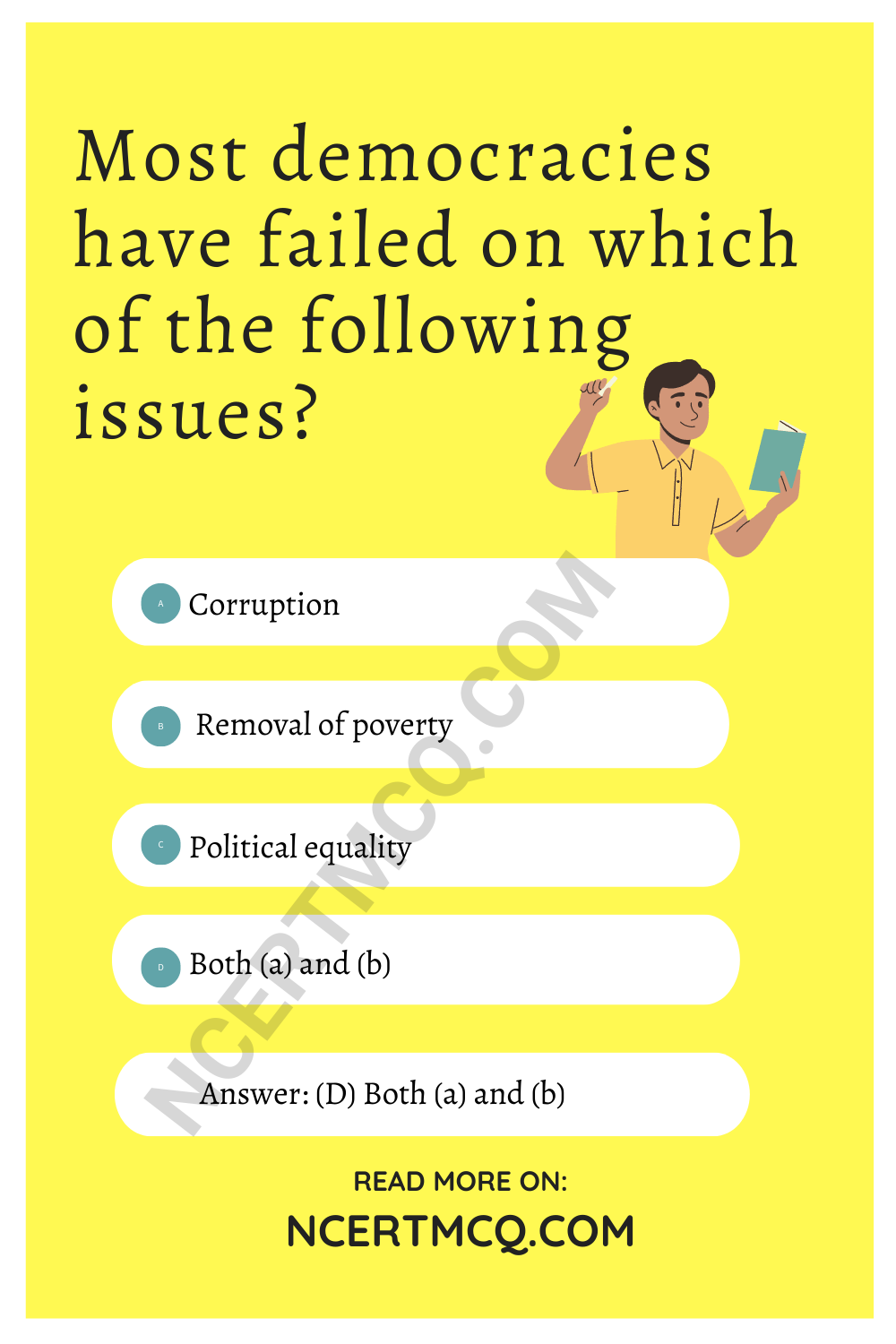
MCQs On Outcomes Of Democracy Question 13.
On which of the following pair of factors, economic development does not depend?
(a) Country’s population size and global situation.
(b) Cooperation from other countries and country’s economic priorities.
(c) Global situation and resources available in the country.
(d) Both (a) and (b).
Answer:
(c) Global situation and resources available in the country.
Outcomes Of Democracy MCQ Questions Question 14.
Which of the following outcome of democracy cannot be ignored?
(a) Democracy’s ability to generate its own support.
(b) Democracy often frustrates the needs of the people.
(c) Democracy often ignores the demands of a majority of its population.
(d) All of the above.
Answer:
(a) Democracy’s ability to generate its own support.
![]()
Outcomes Of Democracy MCQ Class 10 Question 15.
More than half of population of which country lives in poverty?
(a) India
(b) Bangladesh
(c) Sri Lanka
(d) All of these
Answer:
Question 16.
In actual life, democracies do not appear to be very successful in:
(a) Reducing economic inequalities
(b) Maintaining dignity of each individual
(c) Ensuring equality to all
(d) All of the above
Answer:
(a) Reducing economic inequalities
Question 17.
Which of the following features is NOT associated with a democratic government?
(a) Democracy is based on the idea of deliberation and negotiation.
(b) There is transparency in decision¬making.
(c) Decisions are taken quickly and are often forced upon people.
(d) None of the above.
Answer:
(c) Decisions are taken quickly and are often forced upon people.
Explanation: Decisions are taken quickly and are often forced upon people is the feature of dictatorship while in democracy, decisions are taken slowly and it’s a time-consuming process but whatever decisions are taken, is accepted by the people.
Question 18.
Which of the following statements is against the spirit of democracy?
(a) Democracy promotes equality among citizens.
(b) It enhances the dignity of the individual.
(c) It does not allow room to correct mistakes.
(d) It provides method to resolve conflicts.
Answer:
![]()
Question 19.
Democracies are based on:
(a) Social equality
(b) Economic equality
(c) Political equality
(d) All of these
Answer:
(c) Political equality
Explanation: In democracy, all individuals have equal weight in electing representatives. People have the right to form their own political party, to contest election and take part in the decision-making process.
Question 20.
Study the given picture and answer the question that follows:
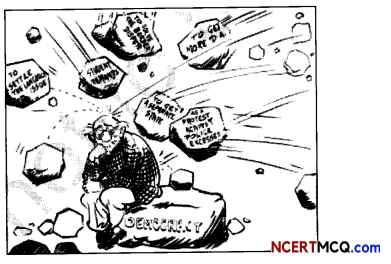
Which one of the following options best signifies this cartoon?
(a) Demand for separate state from Democratic Government.
(b) Democratic Government is facing territorial issues with the bordering states.
(c) Democratic Government is coping with multiple pressures through accommodation.
(d) Democratic Government accepts demands based on separate state.
Answer:
(c) Democratic Government is coping with multiple pressures through accommodation.
Question 21.
Which of the following factors is often missing from a non-democratic government?
(a) Accountability
(b) Responsibility
(c) Transparency
(d) All of these
Answer:
(d) All of these
Explanation: Democracy has the right and the means to examine the process of decision-making. This is known as transparency. Democracy takes care of the needs and expectations of its people which makes it a responsible government.
In democracy, people have the right to choose their rulers and have control over them and they participate in decision-making that affects them all. This makes democracy an accountable government.
Identify
Question 22.
Identify the type of government on basis of the hints given below:
(1) Promotes equality among citizens;
(2) Enhances the dignity of the individual;
(3) Improves the quality of decision-making
Answer:
Democratic governments
![]()
Correct and Rewrite /True-False
State whether the following statements are True or False. If false, correct the statement.
Question 23.
Democracies are based on social prosperity.
Answer:
Question 24.
Democratic governments have a very good record when it comes to sharing information with citizens.
Answer:
Democratic governments do not have a very good record when it comes to sharing information with citizens.
Question 25.
Dictatorships are based on political equality.
Answer:
Democracies are based on political equality.
Explanation: Democracy considers the will of the people above everything. All individuals have equal weight in electing representatives. They have right to vote or contest elections directly or indirectly through their representatives. They can participate in the decision-making process and can change the government in the next election if the government is not taking care of them. Thus, Democracies provide political equality.
Related Theory
Non-democratic governments such as monarchies, military rules, religious leaders or dictatorships do not consider the will of their people. People do not have any right to choose their representatives or change them. Nor these governments are accountable to their people.
Fill in the blanks with suitable information:
Question 26.
The passion for ………………. and ………………. are the basis of democracy.
Answer:
respect, freedom
Question 27.
Democracy transforms people from the ……………….. status of a subject into that of a
Answer:
Citizen
![]()
Question 28.
Ability to handle social differences, divisions and conflicts is a plus point of ……………………..
Answer:
Democratic regimes
Question 29.
Complete the following statement: Democracy remains democracy only as long as every citizen has a chance of being in ……………… at some point of time.
Answer:
Match the Columns choose the correct pairs:
Question 30.
Match the following information from column A with that given in column B:
|
Column A |
Column B |
| (a) Democracy is accountable | (i) Political equality in the country |
| (b) Democracy is responsive | (ii) People’s own government |
| (c) Democracy is legitimate | (iii) to the needs and expectations of its citizens |
| (d) Democracy ensures | (iv) to its citizens |
Answer:
|
Column A |
Column B |
| (a) Democracy is accountable | (iv) to its citizens |
| (b) Democracy is responsive | (iii) to the needs and expectations of its citizens |
| (c) Democracy is legitimate | (ii) People’s own government |
| (d) Democracy ensures | (i) Political equality in the country |
Assertion Reasoning questions Class 10 Civics Chapter 7
In each of following questions, a statemant of Assertion (A) is given followed by a corresponding statement of Reason (R). Select the correct answer to codes (a), (b) (c) or (d) as given below:
(a) Both (A) and (R) are true and (R) is the correct explanation of (A).
(b) Both (A) and (R) are true but (R) is not the correct explanation of (A).
(c) (A) is correct but (R) is wrong.
(d) (A) is wrong but (R) is correct.
Question 31.
Assertion (A): Democracy is a legitimate government.
Reason (R): Regular, free and fair elections are the spirit of democracy.
Answer:
![]()
Question 32.
Assertion (A): Democracies allow room to correct mistakes.
Reason (R): Democratic governments can be reelected.
Answer:
(b) Both (A) and (R) are true but (R) is not the correct explanation of (A).
Explanation: Democratic governments allow room to correct mistakes that have been done in the past through reformed social and political laws.
Question 33.
Assertion (A): A democratic government will take more time to follow procedures before arriving at a decision.
Reason (R): A Democratic government is weak.
Answer:
(c) (A) is correct but (R) is wrong.
Explanation: A democratic government will take more time to follow procedures before arriving at a decision because it is based upon deliberation and negotiation and needs the consensus of the majority before taking any decision.
Question 34.
Assertion (A):A small number of ultra rich enjoy a highly disproportionate share of wealth and incomes in various countries.
Reason (R): Due to income inequalities, poor are exploited and do not receive much.
Answer:
Question 35.
Assertion (A): Democratically elected governments do not appear to be as keen to address the question of poverty as you would expect them to.
Reason (R): They believe that if the poor remain poor they will vote for them more.
Answer:
(c) (A) is correct but (R) is wrong.
Explanation: Poor form a huge part of vote bank politics and hence one would expect governments to focus more on their interests and poverty eradication. This is not the case.
![]()
(Competency Based Questions (CBQs))
Question 1.
Study the data given below and answer the question that follows:
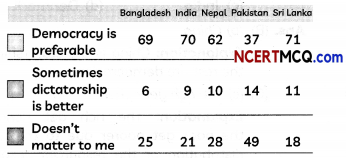
Which of the following countries promise the most support to Democracy?
(a) India
(b) Pakistan
(c) Sri Lanka
(d) Bangladesh
Answer:
(a) India
Question 2.
Read the source given below and answer the question that follows:
We felt that democracy was better because it: Promotes equality among citizens;
Enhances the dignity of the individual;
Improves the quality of decision making;
Provides a method to resolve conflicts; and Allows room to correct mistakes.
Are these expectations realised under democracies?
Considering the aims of a democracy and its realisation, which one of the following features is not common to democratic setups?
(a) They have a formal Constitution.
(b) They hold regular and fair, free elections.
(c) They do not have political parties.
(d) They have a universal adult franchise.
Answer:
(c) They do not have political parties.
![]()
Question 3.
Read the source given below and answer the questions that follow:
But once the principle is recognised, it becomes easier for women to wage a struggle against what is now unacceptable legally and morally. In a non-democratic set up, this unacceptability would not have legal basis because the principle of individual freedom and dignity would not have the legal and moral force there. The same is true of caste inequalities. Democracy in India has strengthened the claims of the disadvantaged and discriminated castes for equal status and equal opportunity. There are instances still of caste-based inequalities and atrocities, but these lack the moral and legal foundations. Perhaps it is the recognition that makes ordinary citizens value their democratic rights.
(A) Which of the following features of democracy has been highlighted in the source?
(a) It cures economic inequalities.
(b) It promotes dignity of individuals by recognising the importance of vulnerable groups and ensuring equality.
(c) It cures political equality.
(d) It is legitimate.
Answer:
(b) It promotes dignity of individuals by recognising the importance of vulnerable groups and ensuring equality.
(B) Which of the following countries do not enjoy a democratic government?
(a) Bhutan
(b) Nepal
(c) India
(d) China
Answer:
(d) China
Explanation: China has an authoritarian government where the president wields all the authority.
(C) Mention one way democracy avoids social conflicts.
Answer:
Democracy avoids social conflicts by accommodating social diversities.
(D) Assertion (A): Democracy establishes social equality.
Reason (R): It works for the interest of all the social groups without any prejudice or discrimination.
(a) Both (A) and (R) are true and (R) is the correct explanation of (A).
(b) Both (A) and (R) are true but (R) is not the correct explanation of (A).
(c) (A) is correct but (R) is wrong.
(d) (A) is wrong but (R) is correct.
Answer:
Question 4.
Read the source given below and answer the questions that follow:
If you consider all democracies and all dictatorships for the fifty years between 1950 and 2000, dictatorships have slightly higher rate of economic growth. The inability of democracy to achieve higher economic development worries us. But this alone cannot be a reason to reject democracy. As you have already studied in economics, economic development depends on several factors: country’s population size, global situation, cooperation from other countries, economic priorities adopted by the country, etc. However, the difference in the rates of economic development between less developed countries with dictatorships and democracies is negligible.
Answer the following MCQs by choosing the most appropriate option:
(A) Which of the following factors does affect economic growth?
(I) Country’s population size
(II) Global situation
(III) Cooperation from other countries
(IV) Economic priorities adopted by the country
(a) (II) & (III) only
(b) (I) only
(c) (111) & (IV) only
(d) (I), (II), (III) & (IV)
(B) Which of the following countries is likely to have a greater economic growth rate?
(a) India
(b) China
(c) Bangladesh
(d) Sri Lanka
Answer:
(b) China
Explanation: China is a dictatorship while the rest are democracies.
(C) How does democracy affect the economic distribution of resources in a country in reality?
(a) It equalises the distribution among classes
(b) The rich get richer.
(c) The poor get richer.
(d) The foreigners get richer.
Answer:
(c) The rich get richer.
Explanation: The rich get richer and the poor get poorer due to the unequal distribution of the resources despite the claim of democracy.
(D) Which of the following countries show a huge economic inequality?
(a) Brazil
(b) China
(c) India
(d) Denmark
Answer:
(a) Brazil
![]()
Question 5.
Read the source given below and answer the questions that follow:
But once the principle is recognised, it becomes easier for women to wage a struggle against what is now unacceptable legally and morally. In a non-democratic set up, this unacceptability would not have legal basis because the principle of individual freedom and dignity would not have the legal and moral force there. The same is true of caste inequalities. Democracy in India has strengthened the claims of the disadvantaged and discriminated castes for equal status and equal opportunity. There are instances still of caste-based inequalities and atrocities, but these lack the
moral and legal foundations. Perhaps it is the recognition that makes ordinary citizens value their democratic rights.
Answer the following MCQs by choosing the most appropriate option:
(A) What makes it easy to wage a struggle against a discriminating act?
(I) Legal force
(II) Recognition of a problem
(III) Moral Force
(a) (I) only
(b) (II) & (III)
(c) (I) & (II)
(d) (I), (II) & (III)
Answer:
(d) (I), (II) & (III)
(B) Which of the following governments does not lack moral and legal sanctions?
(a) Monarchy
(b) Democracy
(c) Oligarchy
(d) Aristocracy
Answer:
(b) Democracy
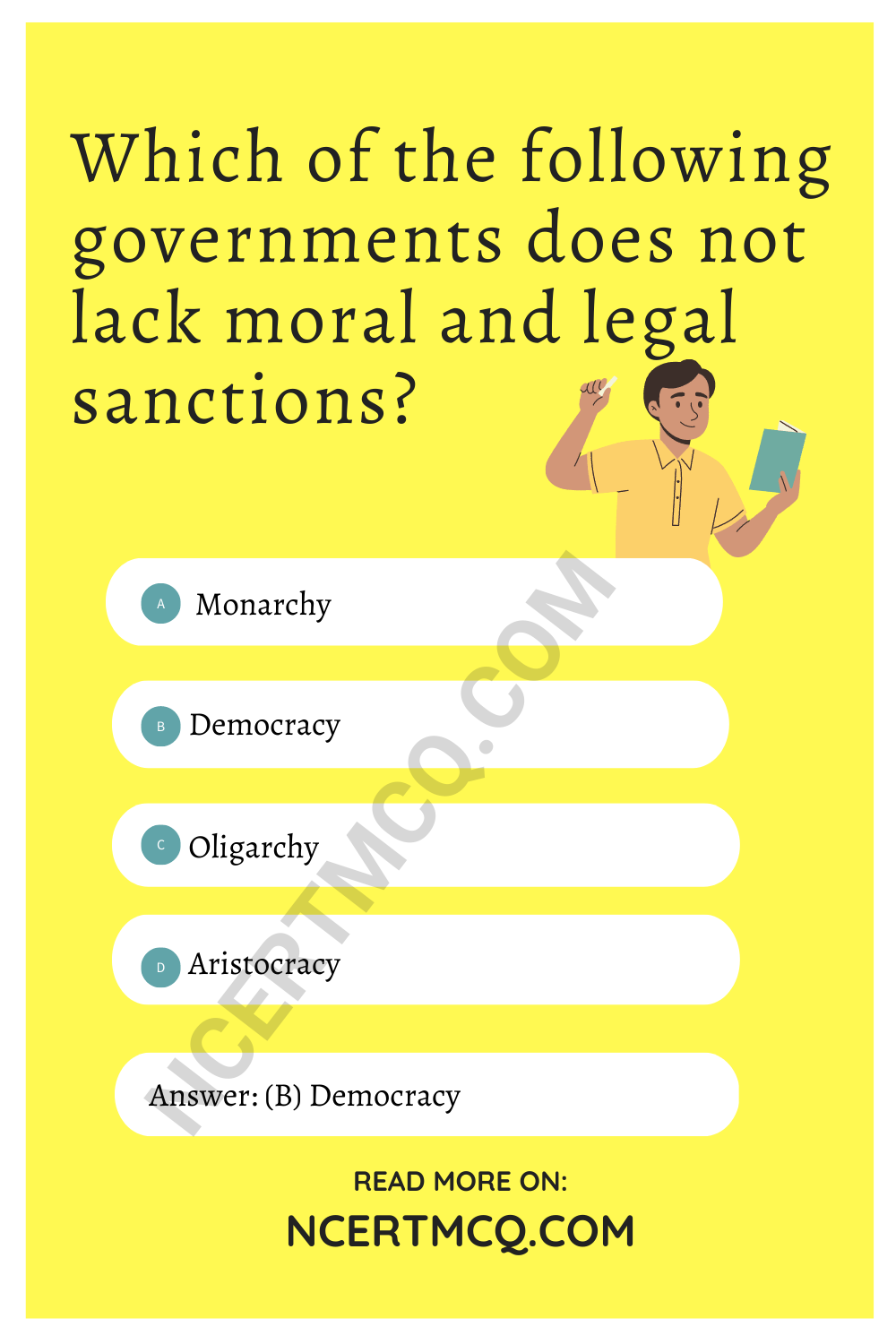
(C) Fill in the blank by choosing the most appropriate option:
Democracy in India has strengthened the claims of the …………. castes for equal status and equal opportunity.
(a) Rich classes
(b) Middle classes
(c) Disadvantaged
(d) Aristocratic
Answer:
(c) Disadvantaged
Explanation: Democracy promotes the dignity of an individual and harmony between classes and castes.
(D) Which one of the following is not the way to resolve a conflict in a democracy?
(a) Mass participation
(b) Using laws and rules
(c) Establishing justice and peace
(d) Armed revolution
Answer:
(d) Armed revolution
Question 6.
Read the source given below and answer the questions that follow:
As people get some benefits of democracy, they ask for more and want to make democracy even better.
That is why, when we ask people about the way democracy functions, they will always come up with more expectations, and many complaints. The fact that people are complaining is itself a testimony to the success of democracy: it shows that people have developed awareness and the ability to expect and to look critically at power holders and the high and the mighty. A public expression of dissatisfaction with democracy shows the success of the democratic project: it transforms people from the status of a subject into that of a citizen. Most individuals today believe that their vote makes a difference to the way the government is run and to their own self-interest.
Answer the following MCQs by choosing the most appropriate option:
(A) Why do people ask for more from democracy?
(a) Because democracy is worth it.
(b) Because democracy guarantees benefits.
(c) Because democracy is better than non democratic governments.
(d) Democracy is half developed.
(B) How do people show public dissatisfaction?
(I) Throughsocial movements
(II) By staying quiet
(III) By expecting more
(a) (I) only
(b) (III) only
(c) (II) & (III)
(d) (I) & (III)
(C) …………….. transforms people from the status of a subject into that of a citizen. Fill in the blank by choosing the most appropriate option:
(a) Democracy
(b) Monarchy
(c) Oligarchy
(d) Dictatorships
(D) Why are people complaining is itself a testimony to the success of democracy?
(a) It shows that people have developed awareness
(b) It shows people know nothing about democracy.
(c) It shows people do not enjoy democracy.
(d) It shows people want to be part of a dictatorship.
![]()
Question 7.
Read the source given below and answer the questions that follow:
Over a hundred countries of the world today claim and practice some kind of democratic politics: they have formal constitutions, they hold elections, they have parties and they guarantee rights of citizens. While these features are common to most of them, these democracies are very different from each other in terms of their social situations, their economic achievements and their cultures. Consequently, what may be achieved or not achieved under each of these democracies will be very different.
(A) Explain the fascination for democracy amongst various countries.
Answer:
Democracies give freedom of speech, expression and religion along with promoting dignity and freedom of human beings. It provides people with a free and dignified life and reduces possibilities of social conflicts. This is why countries are fascinated with democracy.
(B) Explain democracy on the basis of expected and actual outcome.
Answer:
Question 8.
Read the sources given below and answer the questions that follow:
Source A: Accountable, responsive and legitimate government
There are some things that democracy must provide. In a democracy, we are most concerned with ensuring that people will have the right to choose their rulers and people will have control over the rulers. Whenever possible and necessary, citizens should be able to participate in decision making, that affects them all.
Source B: Reduction of inequality and poverty
Perhaps more than development, it is reasonable to expect democracies to reduce economic disparities. Even when a country achieves economic growth, will wealth be distributed in such a way that all citizens of the country will have a share and lead a better life? Is economic growth in democracies accompanied by increased inequalities among the people? Or do democracies lead to a just distribution of goods and opportunities?
Source C: Dignity and freedom of the citizens In a non-democratic set up, this unacceptability would not have legal basis because the principle of individual freedom and dignity would not have the legal and moral force there. The same is true of caste inequalities. Democracy in India has strengthened the claims of the disadvantaged and discriminated castes for equal status and equal opportunity. Source A: Accountable, responsive and legitimate government
(A) Define democracy in a single sentence on the basis of your reading of the given extract.
Source B: Reduction of inequality and poverty
Answer:
Democracy can be defined as a political system in which people have the right of choosing or changing their rulers who are answerable to them.
(B) What are economic disparities? Has the Indian Democracy been capable of reducing them?
Source C: Dignity and freedom of the citizens
Answer:
(C) Justify the statement with an example, “Democracy in India has strengthened the claims of the disadvantaged and discriminated castes for equal status and equal opportunity.”
Answer:
It is true that democracy in India has strengthened the claims of the dis¬advantaged and discriminated castes for equal opportunity. For example, Dalits in India have been given reservations of seats in educational institutions and government jobs while 27 per cent reservation has been given to Socially and Educationally Backward Classes so that they can come up at par with the common people in the society.
![]()
Question 9.
Read the source and answer the questions that follow:
Democracies usually develop a procedure to conduct their competition. This reduces the possibility of these tensions becoming explosive or violent. No society can fully and permanently resolve conflicts among different groups. But we can certainly Learn to respect these differences and we can also evolve mechanisms to negotiate the differences. Democracy is best suited to produce this outcome. Non-democratic regimes often turn a blind eye to or suppress internal social differences. Ability to handle social differences, divisions and conflicts is thus a definite plus point of democratic regimes.
(A) Which is the best form of government to handle social differences?
Answer:
Democratic Governments are better suited to handle social differences than Non- democratic regimes.
(B) How does Democracy handle Social Differences?
Answer:
Democracy accepts, acknowledges social differences and gives less volatile mediums to express it without violence in the country. It develops its own method of competition.
(C) Suggest two ways to increase peace and harmony in a socially/communally divided country.
Answer:
Two ways to reduce differences and promote peace and harmony:
- one should try to first bring total equality among all communities or social groups. No group should be preferred for any favours.
- one should try to develop national unity by reminding them of shared struggles, culture and historical events.
Very Short Answer Type Questions
Question 1.
What is meant by transparency?
Answer:
Transparency means that every citizen belonging to any democratic country has the right to information, the right to examine or investigate whether the laws, plans, action, policies or decisions taken by the government are correct or are beneficial to them or not.
Question 2.
How does democracy produce an accountable development?
Answer:
Democracy produces an accountable government by giving the citizen the right to examine the process by which decisions are made.
Question 3.
Give any one example of economic development in dictatorial regimes.
Answer:
Dictatorships have higher rates of economic growth as compared to democracies. For example, China’s growth rate is higher than most of the other democracies in the world.
![]()
Question 4.
If you want to extract information about the functions of any government department, which right would you exercise?
Answer:
I would exercise my Right to Information (RTI) to extract information about the functions of any government department.
Related Theory
The Right to Information (RTI) Act was passed by the Parliament of India to set out rules and procedures regarding citizens’ right to information. Under the provisions of this act, any citizen of India may request information from any public authority by filing a petition in the court.
Question 5.
Mention any two common features of democratic politics.
Answer;
Features of democratic politics are:
- Free and fair elections are organized.
- The principle of one person, one vote, one value’ is followed.
- Major decisions are taken by elected leaders.
- The rule of Law prevaiLs.
Related Theory
Democracy is a form of political system in which the government of a country is elected by the citizens through free and fair elections.
Question 6.
How is democracy based on political equality in India?
Answer:
In India, every citizen above 18 years of age has the right to vote. Every citizen has the right to contest elections irrespective of his/her caste, religion, creed, economic status, etc. if he/she is 21 years of age. Hence, democracy is based on political equality in India.
Related Theory
Democracy is a form of government which is for the people, of the people and by the people, it promotes equality and discourages all forms of discrimination- social, economical or political.
![]()
Question 7.
Which type of government develops mechanisms for citizens to hold the government accountable?
Answer:
Question 8.
What does this image show about the outcomes of democratic politics? Explain in your own words.
Answer:

MCQ Questions for Class 10 Social Science with Answers
Class 10 Social Science Civics MCQ:
